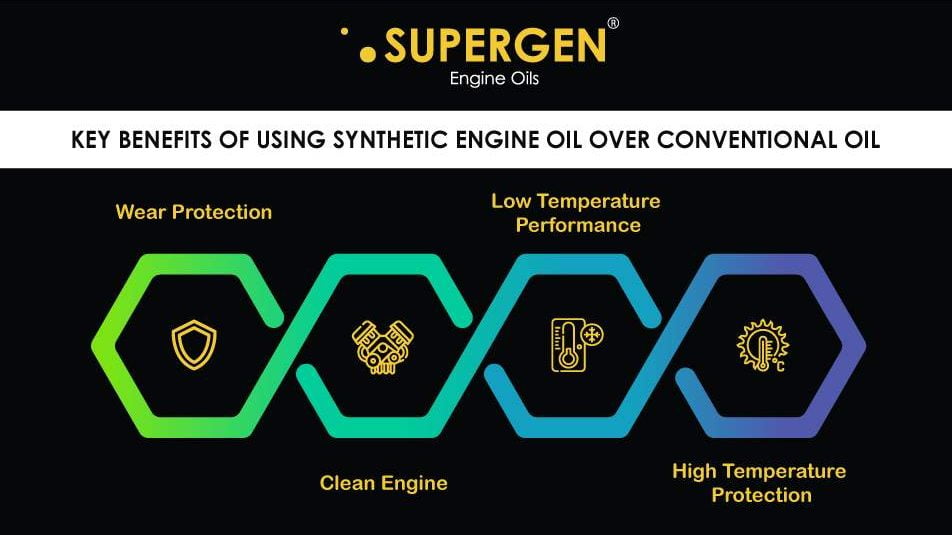How To Choose Between Synthetic And Conventional Engine Oil?
A car’s health and functioning depends a lot upon the health of its engine. One can say that the engine is like the heart of the car. It, therefore, controls all the vital aspects of the car’s performance.
However, if the engine is the heart, then one can also say that engine oil is the lifeblood of the car.
The engine oil offers protection and lubrication to the engine which allows it to function smoothly.
Thus, the engine oil can make or break the engine. While choosing engine oil, one has a lot of options. There are different grades as well as categories that are available in the market.
The three main categories of engine oil, conventional mineral oil, semi-synthetic oil and synthetic oil, all offer their own advantages and disadvantages, which can make the choice rather difficult.
Here is all you need to know in order to choose between synthetic oil and conventional mineral oil for your engine:
Difference between synthetic oil and conventional oil
While synthetic and conventional oil are both engine oils, they have vastly different manufacturing processes, which is why they are very different in chemical terms.
Conventional oil is essentially crude petroleum oil which is refined to a certain extent to form mineral oil. This refinement removes natural contaminants and unwanted hydrocarbons but the oil is left largely as it is.
On the other hand, synthetic oil is manufactured fully in a laboratory. This means that synthetic oil is formed through a series of very complex processes through which all the impurities are removed.
This process makes the oil chemically suitable for its specific usage. In fact, engineers chemically develop synthetic oils through petrochemicals, which means that they process it at the molecular level.
Advantages of synthetic oil over conventional oil
Synthetic oil provides a range of benefits that conventional oil cannot, due to the fact that it is processed for usage in a laboratory. Conventional oils are less refined, which makes them less chemically stable.
It also means that conventional oils oxidize and acidify easily, and can break down and lose their protective qualities very fast. Which in turn, means that they need to be changed often.
Furthermore, conventional oils are also thicker and slower, which leads to higher fuel consumption of the vehicle. All these reasons make conventional oil impractical and ineffective, which is why people today only use it on older vehicles.
On the other hand, synthetic oil offers many advantages that make it the most effective type of engine oil available today. Synthetic oils are processed by mixing in certain useful additives which help the engine combat sludge and deposit.
Synthetic motor oils are also more efficient at providing all round protection at all temperatures. They also reduce wear and tear of the engine in general.
Overall, synthetic engine oil is more fuel efficient, require lesser changes and offer higher protection and lubrication in all circumstances, as compared to conventional mineral oils.
Key benefits of using synthetic engine oil over conventional oil

Wear protection
The parts of an engine are constantly moving and coming in contact with one another. This means that these parts create a significant amount of friction within the engine.
Synthetic oil acts as a strong barrier of lubrication and protection between these parts. It thus reduces friction and wear and tear and increases the overall life of the engine.
Clean engine
As oil circulates in the engine, it can pick up deposits of pollutants which can form a sticky black sludge in the engine. This sludge reduces the engine’s efficiency and becomes a problem.
Synthetic engine oils can resist the formation of sludge due to the additives present and ensure that the engine remains clean for a long time.
Low temperature performance
When a car is not being driven, the engine oil settles down and only begins flowing when the car is started again. In low temperatures, the oil tends to thicken due to the cold. It can take time to start flowing again on ignition.
However, synthetic oil is specifically engineered to withstand cold temperatures. It can thus flow smoothly even at low temperature, which ensures equal performance at all temperatures.
High temperature protection
Engines tend to become hot when running at high speeds, even more so if they are being driven in hotter areas. Conventional oils often break down as a result of this heat and evaporate, exposing the engine to wear and tear.
However, synthetic oils are customised to resist this sort of breakdown and continue to provide protection to the engine even at high speeds and high temperatures.
Conclusion
Engine oil is essential in the optimum functioning of an engine. There are three types of engine oils, namely conventional mineral oil, semi-synthetic oil and synthetic oil.
However, it can be hard to choose between the different types of engine oils available. Synthetic oil is the most technically advanced oil out of the three and is manufactured in laboratories.
This oil is engineered to protect and lubricate the engine to perfection. Thus, due to its chemical superiority, synthetic oil is able to resist pollution, corrosion, wear and tear and break down. It can keep the engine safe, making it the superior choice over conventional oil.



